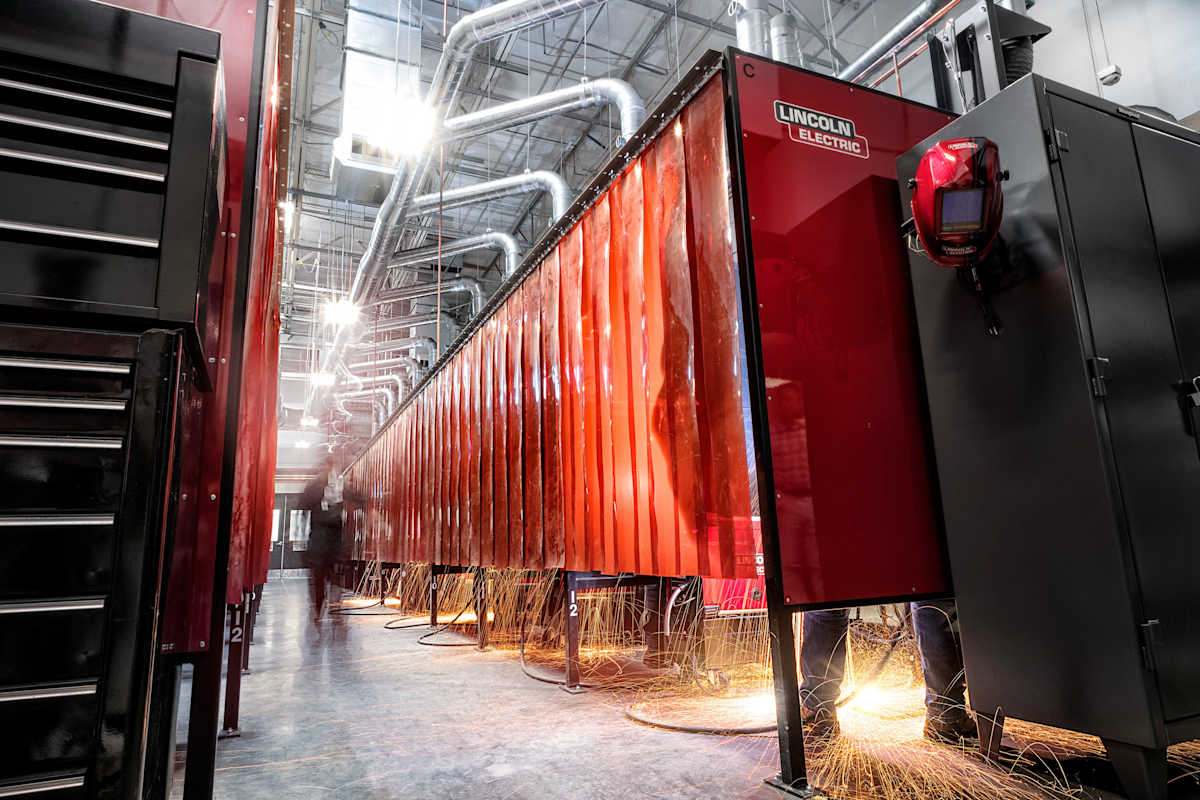Introduction to Fabrication in Welding
What is welding fabrication? Read our guide on the importance of fabrication in welding and how UTI can help you learn this in-demand skill!
A science and an art — Welding is the process of bonding metals using heat and pressure to create new structures and parts.
Welding can be a rewarding career for individuals who enjoy problem-solving and creating. Welding technicians are in demand across various industries, including oil rigging, construction, aerospace, manufacturing, transportation and robotics. A welding career offers versatility, room for growth and opportunities to try new things.
If this sounds like something you desire from a career, consider studying to be a welding technician at Universal Technical Institute (UTI).1 Most employers prefer candidates with a high school diploma and technical training. Welding training programs typically range from a few months to a year.
Is welding a good career? Keep reading to learn more about why we think welding could be a good career path and determine if you do too.
Welding technician skills are in demand across various industries, including:
Welding duties can vary depending on the work environment. For instance, one welder’s day might look like manufacturing farm equipment, while another may consist of inspecting and repairing pipes.
With that said, there are responsibilities employers generally require of their techs, regardless of the industry. This includes:
These are all reasons why welding is a good career. We will go over more of the benefits below!
Is welding a good job? Here are a few benefits to a welding career.
A desirable factor of pursuing a welding career is that you don’t need to go to a four-year college to be eligible. Most employers only require a high school diploma or GED for entry-level welding jobs. They also prefer candidates who have gone through formal welding training, which can be completed in just 9-10 months at a school like UTI.
Because most welders enjoy thinking outside the box, they also appreciate opportunities to try new things. In fact, some welders remain inspired by pursuing employment across industries throughout their careers, while others might use their experience to start their own businesses.
Aside from versatility, a welding career could offer room for growth for those with the right skills, certifications and industry experience. Most UTI grads start out working as entry-level technicians or in other entry-level roles. With enough experience and hard work, some welding technicians may be able to advance into positions such as certified welding inspectors, teachers or project managers.77
While some employers are willing to provide on-the-job training that begins at Square 1, the Bureau of Labor Statistics (BLS) reports that most prefer to hire candidates with a high school diploma and technical training.
Candidates with technical training typically enter the field with an entry-level understanding of blueprints, safety standards, electricity and shop mathematics that employers can build upon.

UTI’s welding school curriculum was created in collaboration with Lincoln Electric, a manufacturing and design leader in welding technology. Students learn the four types of arc welding and various welding positions to help prepare them to pursue entry-level positions.
UTI’s welding courses include:
Most welding training programs range from a few months to a year. The welding technician training program at UTI only takes 9-10 months to complete. Graduates can take advantage of our Career Services department which has relationships with employers across the country. They provide assistance with helping grads and students find potential career opportunities.
They also help prepare students through resume development, interview training, career development classes, career coaching and more! While employment cannot be guaranteed, at UTI, we place great emphasis on assisting our students.
The BLS projects over 42,000 estimated average annual welding job openings in the United States between 2022 and 2032.42
As our nation’s infrastructure continues to age, structural iron and steel welding technician skills are expected to be in demand. Manufacturing industries will also require welders to produce metal parts for the transportation industry. But what kind of roles could you pursue as a new UTI grad?
Here are a few entry-level welding roles:
To learn more about advanced welding career paths, check out our career page.
According to the BLS, the median annual wage for welders, cutters, solderers and brazers in the U.S. was $51,000 in May 2024.26 This means half of the welding technicians earned more and half earned less. Keep in mind that salary depends on several factors, including experience, employer, demand and cost of living in the area.
Welding can be a mentally and physically demanding job. Welders are required to produce precise work while meeting deadlines. They often work in hot environments, must bend into uncomfortable positions and lift heavy objects.
According to the BLS, welders who work in scheduled air transportation and the electric power generation, transmission and distribution sector are among the highest paid.
Welding technicians are generally comfortable with fractions, decimals, geometry, formulas, trigonometry, conversion and other forms of math. Attending a welding school before pursuing a career may increase your comfort level with the type of math required for this career.
We hope this guide has answered your question, “Is welding a good career?” as well as, “Is it for me?”
Pursuing a welding career can be an exciting journey for creative problem-solvers who also consider themselves lifelong learners. If you think that might be you, request more info online. We’ll connect you with an Admissions Representative who can answer any remaining questions you have or walk you through enrollment!
Universal Technical Institute of Illinois, Inc. is approved by the Division of Private Business and Vocational Schools of the Illinois Board of Higher Education.